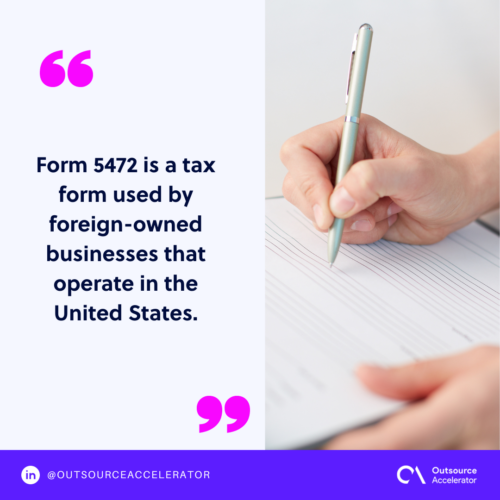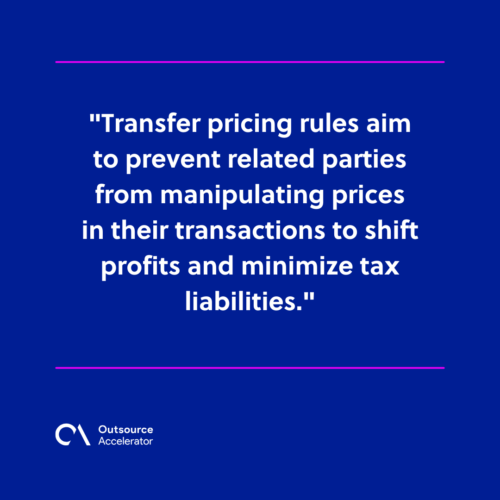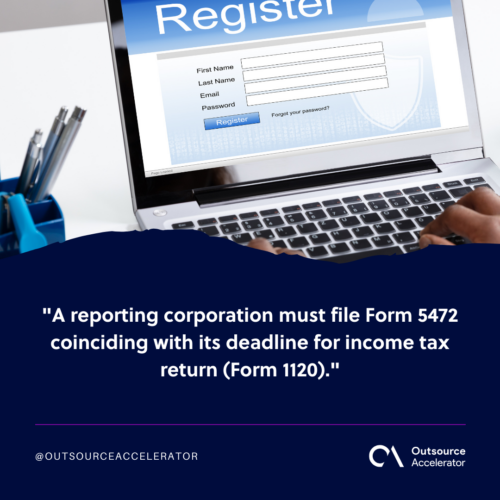Form 5472: What you need to know

If you’re running a business in another country that is also operating in the United States, filling out Form 5472 is necessary.
This form is one of the keys to navigating the U.S. tax landscape for local and global profits. It intends to monitor earnings that might be subjected to withholding tax imposed by the U.S. tax authorities.
So, if your business is a global player and making good in the U.S., Form 5472 lets the tax authorities know what you’ve been up to in the American business playground.
Let us discover more about the use of the said form as we go along in this article.
What is Form 5472?
See Form 5472 (Rev. December 2022)
Form 5472 is a tax form used by foreign-owned businesses that operate in the United States. It helps the U.S. government track certain transactions and activities of these businesses for tax purposes.
Form 5472 is a tool to promote transparency and ensure that everyone is on the same financial page. The said form is available at the International Revenue Service (IRS), the National Revenue Service of the U.S.
This form also serves as an information report to meet the reporting requirements set by the federal government under Internal Revenue Code (IRC) sections 6038A and 6038C.
A corporation involved in a financial or non-financial reportable transaction with a related party, whether domestic or foreign, must submit Form 5472 along with its income tax return.
Failing to file Form 5472 or maintain proper records results in a $25,000 penalty, with an additional $25,000 fine for failing to rectify the deficiency within 90 days of IRS notification.
Failure to accomplish Form 5472 properly will result in a failed filing.

Importance of Form 5472
Form 5472 is vital for preventing tax evasion and ensuring U.S. businesses, especially those with global ties, comply with tax regulations, contributing responsibly to national tax revenue.
To provide a more detailed perspective, consider the following specific reasons underscoring the significance of Form 5472:
1. Compliance with tax regulations
Filing Form 5472 is a legal requirement for reporting corporations that engage in monetary or non-monetary transactions with foreign or domestic related parties.
It ensures compliance with specific sections of the IRC, particularly in sections 6038A and 6038C.
Many businesses in the U.S. with foreign ownership consider hiring remote workers for accounting to other countries like the Philippines. This is to ensure sound filing of necessary documents for tax regulations.
2. Transparency and information sharing
The form facilitates transparency in financial dealings between reporting corporations and related parties.
Providing detailed information about these transactions helps tax authorities monitor and understand the economic activities of the reporting corporation.
3. Prevention of tax evasion and avoidance
The information disclosed on Form 5472 helps tax authorities identify potential attempts to help business owners avoid tax evasion-related matters.
It allows them to scrutinize transactions that might impact the taxable income of the reporting corporation and ensures that appropriate taxes are paid.
Some businesses aid the filing of tax-related forms by using customized Software-as-a-Service (SaaS) tools. It helps owners track deadlines and streamline filing processes through monitoring and other technology-based features.
4. Monitoring international business activities
For foreign-owned businesses operating in the U.S., Form 5472 is a mechanism for the U.S. government to keep track of the business activities conducted within its borders.
It is crucial for regulating international trade and ensuring businesses contribute their fair share to the U.S. tax system.
5. Enforcement of transfer pricing rules
Transfer pricing rules aim to prevent related parties from manipulating prices in their transactions to shift profits and minimize tax liabilities.
Form 5472 plays a role in the enforcement of these rules by requiring detailed information about the nature and terms of transactions with related parties.

Who is required to file Form 5472?
There are two types of reporting corporations:
- U.S. corporations with at least 25% foreign ownership
- Foreign corporations conducting business within the United States
The first category is relevant when a corporation has a foreign shareholder who holds at least 25% of the total voting power or value across all classes of stock.
Exemptions for filing Form 5472?
Like other legal documents, Form 5472 comes with its exemptions. Business owners should familiarize themselves with these exemptions to navigate the tax landscape effectively.
- Foreign corporations that file Form 8833 and have no permanent establishment in the U.S. under any income tax treaty.
- International companies that meet all of the reporting requirements of IRC sections 883 and 887 and whose gross income is tax-exempt under section 883.
- The related party and reporting corporations are not U.S. persons. The gross income from the business transactions does not include any sources within the U.S., loss, expense, or other deductions allocated or apportioned to this income.
When to file Form 5472?
A reporting corporation must file Form 5472 coinciding with its deadline for income tax return (Form 1120). For most corporations, the due date is the 15th day of April, following the end of the corporation’s tax year.

However, if you file a six-month extension for your Form 1120, Form 5472 will also be postponed to the same date, October 15th, 2024, for the 2023 tax year.
In general, it’s advisable to file Form 5472 promptly to comply with tax regulations and avoid any potential penalties.
If there are changes to the filing deadlines or requirements, the IRS will provide official guidance, so it’s essential to stay informed about any updates to tax regulations.







 Independent
Independent




